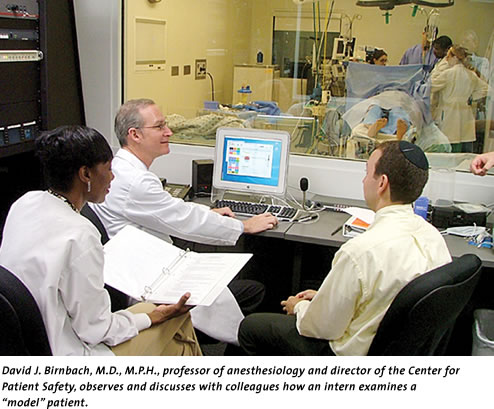Advocate for
a culture of Safety
David Birnbach Pushes
UM-JMH
Center for Patient
Safety to New Heights
![]() re
there spies on the patient floors watching doctors, nurses, and residents?
David J. Birnbach, M.D., M.P.H., head of the UM-Jackson Memorial Hospital
Center for Patient Safety will tell you it’s not like undercover
agents are roaming the wards, but he’ll sometimes have observers
report back about hand-washing habits.
re
there spies on the patient floors watching doctors, nurses, and residents?
David J. Birnbach, M.D., M.P.H., head of the UM-Jackson Memorial Hospital
Center for Patient Safety will tell you it’s not like undercover
agents are roaming the wards, but he’ll sometimes have observers
report back about hand-washing habits.

Yes. Hand washing.
This is an example of how seriously Birnbach, professor of anesthesiology, takes his duties as associate dean and director of the Center for Patient Safety. Hand washing is important, and even experienced physicians can forget sometimes with the pressures of a busy big-city hospital. But because not washing hands between patients is a national hospital hazard that can lead patients to develop infections and possibly die, Birnbach, the UM Miller patient safety czar, doesn’t let up.
“There is no excuse,” says Birnbach, the director since 2005, “especially at a teaching hospital where young doctors pick up good or bad habits by watching more senior doctors. It is key to safety at this hospital.”
Of course, the center, among the most advanced of its kind in the nation, is concerned about more than clean hands. He will tell you it’s a team effort—but since taking the helm a few years ago, Birnbach, who also was recently appointed UM’s new vice provost for faculty affairs, has boosted the center’s mandate and mission.
According to David A. Lubarsky, M.D., M.B.A., Emanuel M. Papper Professor and chair of the Department of Anesthesiology, Birnbach pushed the Center for Patient Safety “to true clinical relevance—from his statewide role cataloguing and analyzing all the near misses in health care being reported in the state of Florida to the cultural change enshrining safety being inculcated in every new trainee at Jackson.”
The center’s interns course is a requirement for all incoming interns and new upper-level residents before they start at Jackson. Also, the center offers courses to staff, custom-designs seminars for outsiders, and runs a state-of-the-art simulation center. Much of what they do now involves team training so that physicians and nurses can learn to communicate better to improve patient safety.
Maureen Fitzpatrick, M.S.N., A.R.N.P., senior nurse research associate at the center, says Birnbach is a veteran researcher and a “terrific team leader who is passionate about patient safety, especially at UM/JMH.”
Birnbach was recruited to UM from Columbia University in 2002. He brought with him a Department of Defense grant and program that did teamwork research on labor and delivery floors. The military saw the calm then sudden chaos of delivery floors as good places to teach the communication skills needed in high-intensity situations.
Says Birnbach: “We are at the top in the country for the amount of research and training we do, especially as it relates to teamwork and communication among interns and medical students.”